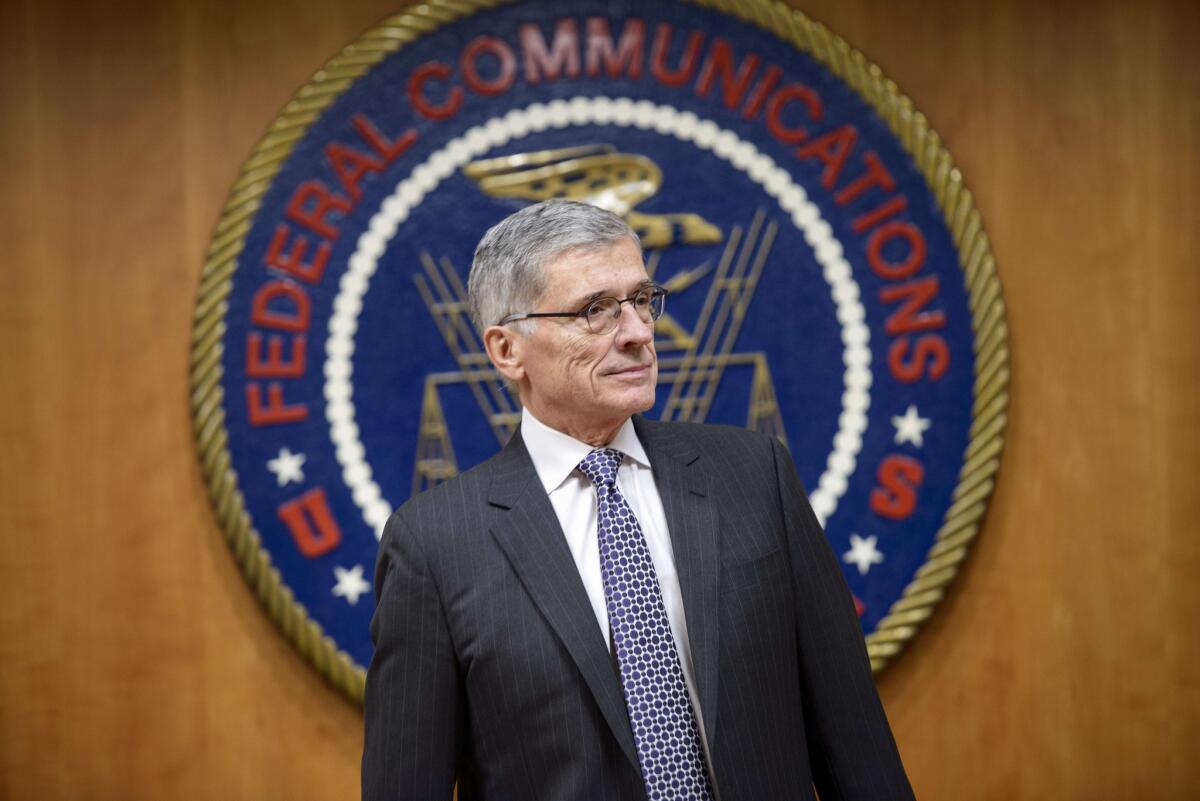FCC increases funding to boost Internet speeds at schools, libraries

Federal Communication Commission Chairman Tom Wheeler supported the commission’s move Thursday to increase funding for high-speed Internet access at schools and libraries.
In a partisan vote, the Federal Communications Commission approved a major increase in funding — $1.5 billion — to help give schools and libraries high-speed Internet access.
Democrats and Republicans agreed on the need to expand broadband access. But they differed sharply Thursday on hiking the budget of the so-called E-rate program, which is funded by consumers from fees on their monthly phone bills.
The agency’s three Democratic commissioners said it was crucial to raise the annual budget for the program to $3.9 billion from $2.4 billion so students, particularly in rural and urban areas, would have the high-speed connections needed for 21st Century learning.
About 63% of public schools, or more than 40 million students, lack high-speed Internet connections, the FCC said.
“Broadband is the greatest equalizer of our time, but this only holds true if everybody has access,” said Commissioner Mignon Clyburn.
FCC Chairman Thomas E. Wheeler, who pushed for the increase, said it amounted to just 16 cents a month for every landline and wireless phone number.
“The greatest moral responsibility that any generation has is the preparation of the next generation,” he said. “Less than a cost of a soda at McDonald’s over the course of a year is a small price to pay for that great responsibility we all have.”
But the FCC’s two Republicans, Ajit Pai and Michael O’Rielly, objected to what they called a tax hike on Americans, who pay for the program through Universal Service Fund fees.
The E-rate program is wasteful and overly bureaucratic and should be reformed to find additional money for schools and libraries, they said.
Thursday’s vote meant “students and teachers, parents and school boards, librarians and library patrons ... will have to wait for the bold solutions that could help them,” Pai said.
“For now, they’ll just have to contribute more to the E-rate program and get less out of it,” he said.
Before the vote, teachers and administrators from rural and urban schools addressed the commissioners and told them that faster Internet access was vital to educating their students.
“The Internet has obliterated my classroom walls,” said Valyncia Hawkins, a teacher at Anne Beers Elementary School in Washington, D.C.
FCC Commissioner Jessica Rosenworcel pointed out that E-rate funding was capped 16 years ago, allowing inflation to diminish its purchasing power.
“At a time when digital skills are an essential part of preparing students for the modern economy, one of our most effective programs is frozen in the age of dial-up,” she said.
Sen. John D. Rockefeller IV (D-W.Va.), who helped create the program in 1996, praised the FCC’s vote.
“Today’s action will provide generations of students the opportunity to compete in an increasingly interconnected and data-driven world — and ultimately lead them to brighter futures,” Rockefeller said.
He and Sen. Edward J. Markey (D-Mass.), another key player in getting the program included in the 1996 update of telecommunications laws, wrote to Wheeler last summer urging him to increase the funding.
The FCC voted 3-2 in July to modernize the program, including focusing on expanding funding for school Wi-Fi networks so students would have Internet access at their desks.
Pai and O’Rielly wanted a broader overhaul that streamlined paperwork and focused the program on expanding access at rural schools.
Pai warned at the time that the FCC would raise the amount consumers pay into the program and complained Thursday that Democrats waited until after the congressional midterm elections to do it.
He said monthly Universal Service Fund fees have increased 60% under the Obama administration.
After Thursday’s vote, the fee will rise from 99 cents to $1.15 a month for each landline and mobile connection. The average household has about three connections.
Reforms to the E-rate program could have allowed for greater spending to boost Internet speeds without a funding increase that amounted to a “tax increase for hardworking families,” Pai said.
The sharp objections by Pai and O’Rielly irked Wheeler.
“I’m aghast at the hostility that is expressed at giving students the tools they need to get a 21st Century education,” he said.
For breaking economic news, follow @JimPuzzanghera on Twitter







